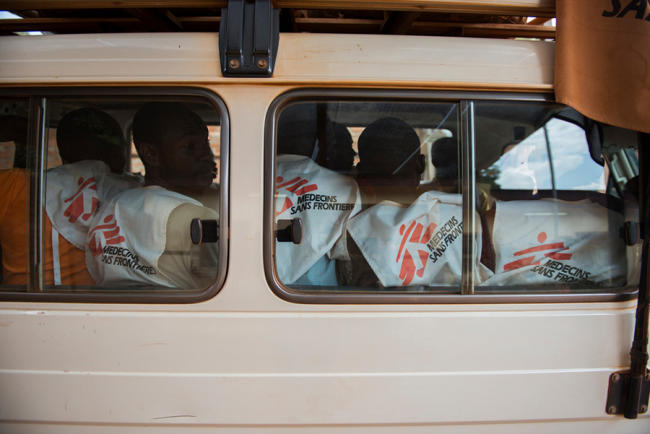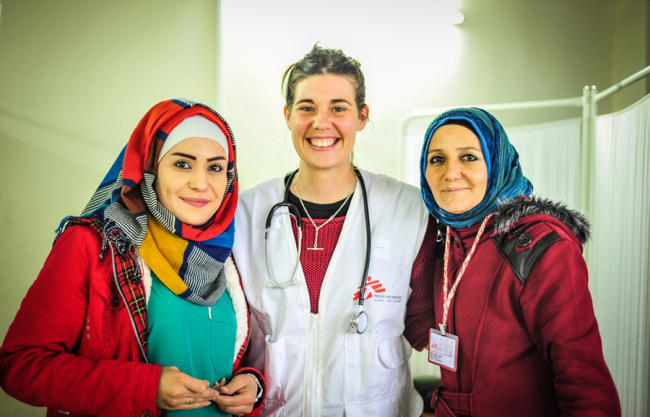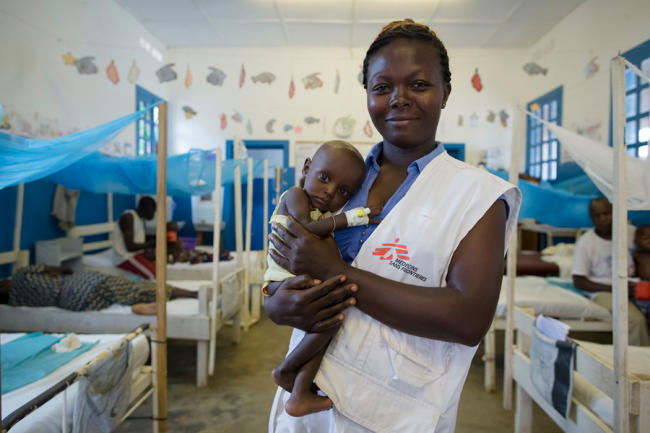In September, I wrote to you about four innovation projects that MSF funded through the Sapling Nursery - a special fund that supports our staff to develop and test new ideas we hope will improve the care we provide to our patients. These four projects are now rolling and we will bring you updates soon. In the meantime, the Sapling Nursery opened its doors to new proposals once more last month. Here’s the latest news….
The number of proposals this time was high - 21 different ideas were submitted. This is nearly as many as all our the previous proposals added together!
"Three ideas were chosen for their potential impact, feasibility, and innovation"
The second bit of good news was that many of these came straight from our teams working on the ground, in our medical projects around the world. As in many large organisations, MSF sometimes struggles to provide opportunities to its staff on the ground to innovate for the future. Previous proposals have mainly come from our headquarters staff and specialists. They’re still great ideas, but it can mean that they aren’t always representative of the current needs of those working in the field, face to face with our patients.
Lastly, the quality of proposals was very high, and represented everything from from small inventions to potentially transformative projects. In the end, three ideas were chosen for funding, based on their potential impact, feasibility, innovativeness and the expert opinion of the funding committee. Here’s a brief description of the successful proposals, which will now be developed and tested...
1) Lean Chemical Weapons Kit (LCWK)

Working in areas where there’s a threat from chemical weapons is stressful. Personal decontamination kits can offer some protection in the event of exposure to chemical weapons, but they are bulky and hard to store in the cramped conditions that our staff often find themselves working in, even though they should be within reach at all times. This contradiction can mean that precious time is wasted worrying about the kit rather than focusing on healthcare delivery for patients.
The Lean Chemical Weapons Kit is a project proposed by an MSF logistician recently on assignment in Iraq. Through lean design principles, he aims to develop a discrete, efficient and ergonomic decontamination kit, designed to be ever-present, but barely noticeable, and with a foolproof procedure (in fact, it will be tested by blindfolded participants), meaning that staff working in these tough circumstances can be confident in their equipment and dedicate their attention to the patients in front of them.
2) Task-based modelling for safe nurse staffing levels

From providing intensive care to our sickest patients to leading the fight for infection control, nurses play a central role in MSF’s provision of healthcare to patients and are integral in all MSF teams. Ensuring that nurse staff levels are sufficient to ensure patient safety and maximise the level of care we provide is an important challenge for MSF. This means ensuring the team on shift at any time has a suitable mix of education, skills and experience.
Current safe staffing ratios for nurses were developed by experts on a one-size-fits-all basis. The team behind this proposal seek to take a data-driven approach to augment the current ratios by incorporating staff modeling based on workload data. This means capturing workload or task data (how long a task takes, how many people it involves, how often it happens etc) relating to the care being delivered, our patient characteristics, our care settings, our staff characteristics, tasks that actually get missed and level of satisfaction. Once they have this data, the team can then start to develop models to predict nurse staff needs for current and future scenarios. However, they are not at this point yet...
The first phase of this project is to try to develop a data capture tool that can record the whole spectrum and complexity of nursing activities in MSF project locations - not an easy task in itself!. The information needs to be of sufficient quality that it can provide insight into the relationship between nursing activities and the quality of care MSF provides to patients. Watch this space...
3) Malnutrition screening toolbox for children under 6-months old

Many of the infants below 6 months of age who are seen at MSF hospitals and clinics are there for treatment for infectious diseases. But in many of places where MSF works there is a high chance that these babies also have underlying malnutrition. Early treatment of this malnutrition increases the odds that the baby will survive, decreases the likelihood that they’ll catch disease and also helps them grow.
However, screening babies this young for malnutrition is not easy, partly due to the tools available to our medical staff. The most common approach at the moment is to use measuring boards to check the baby’s growth. These are cumbersome and heavy, and the paper forms used to measure levels of malnutrition are complicated and prone to human error. In MSF projects, malnutrition screening at this young age is not standard in many of our medical projects.
To address this gap, an MSF epidemiologist in India has proposed to implement and test a new toolkit, including a digital infantometer (a length measuring device for babies) and a z-score calculator (an app that calculates malnutrition levels from weight and height readings), developed by the World Health Organisation. These tools will be evaluated to assess their feasibility in MSF projects and to see whether their use can mean an increase in the number of infants under 6 months we can screen and, therefore, treat for malnutrition.
---
The Sapling Nursery funding programme is just one of the ways MSF encourages innovation around the tools, services and strategies we use to provide the best possible treatment to vulnerable people experiencing humanitarian crises. If these ideas bear fruit, we hope they can have a positive impact on our work, but even if they are tested and fail, we can learn a huge amount from them.
As much as possible, we try to share our successes and our learnings. If you’re interested, follow the MSF Innovation blog for updates or find us on twitter at @MSF_Innovation.
Read more...
> Posts about MSF innovation


